- Home
- Christie Golden
STAR TREK: The Original Series - The Last Roundup Page 7
STAR TREK: The Original Series - The Last Roundup Read online
Page 7
[78] “I’m Skalli Jksili, Kal-Tor,” she said, bowing deeply. “As a member of this colony, and especially as a Huanni, I look forward to getting to know you and your people better.” For her, it was an extraordinarily restrained response. Kirk was surprised.
“We will be visiting from time to time, to discuss how things are progressing,” Lissan said. “Perhaps there will be a chance for us to converse then. In the meantime, I see that you have much to do. Julius, you know how to contact us if you have problems.”
He touched a bright button on his robe. “Please transport,” he said, and he and the others vanished.
“Wow!” Skalli yelped, her composure evaporating like dew beneath a strong sun. “That was a Falorian! A real, live, Falorian! I can’t believe it!”
“Believe it,” Kirk said, putting a restraining hand on her slim shoulder. “Come on. Let’s unpack and make this place home.”
Despite the assurances of Kal-Tor Lissan, the colonists did not see a great deal of the Falorians, and most of them seemed to like it that way. The first few days were filled with the practical necessities of simply getting the colony up and running.
Most of the Mayflower II’s vast storage space had been devoted to materials that were now put to good use in constructing sound, stylish shelters. Part of the ship itself was broken down as well. They would need to keep her in flying order in case of an emergency evacuation, of course, but she could be largely stripped and much of her parts utilized. No rustic log cabins [79] here; all was new, gleaming, and very high-tech.
In keeping with Alex’s sentiment that he wanted this colony to feel like a family, there was only one large building. In the center was a room that could accommodate all the colonists with ease. Here was where reports on progress would be given and where weekly meetings would be held. Right off this room was a mess hall, with a large pantry to store food harvested from Sanctuary’s bounty and top-of-the-line equipment for preparing it. The entire left section of the compound was composed of labs and testing areas; the right-hand side, of living quarters. Kirk was quite relieved when he learned that he would have a private room, although when he saw it, he thought it smaller than his ready room aboard the Enterprise.
A staggering quantity of delicate, complex equipment was hauled out and set up in the testing areas. Scott, who was finally actually able to get his hands on some of these technological beauties, was openly in awe of them. This endeared him to his fellow engineers, most of whom had had a hand in creating the obviously admired technology.
There was a wide-open field right in front of the building. When there was time, people dragged out chairs to watch the sunset before heading in to dinner. It had gotten the name of the Courtyard, although it wasn’t one in the real sense of the word, and as names often do, this one stuck.
There was a new sense of camaraderie as the colonists worked together to build their new homes and workplaces. But once they had finished construction, the [80] colonists dove for their laboratories like gophers for their holes, and Kirk again felt the discomfort he had experienced while they had traveled to get here.
He had expected that Skalli would be a complete nuisance, but she turned out to be only a moderate one. With her eidetic memory and the staggering rate at which she was able to absorb information, she quickly became rather popular among the Sanctuarians, as the colonists had taken to calling themselves. She flitted easily from engineering to chemistry to medicine to geothermal mapping, and was clearly enjoying herself immensely. Her eyes still lit up whenever Kirk entered a room, however, and whenever she had a free moment she would seek him out. But she was in great demand, and her time was rarely her own. Kirk imagined that eventually, once they had learned to control their emotions to some degree, the Huanni would be very valuable contributors to the Federation.
Even his old friends Scotty and Chekov were less frequent companions than he had expected. He wasn’t surprised that Scotty had been so taken with the bright and shiny new engineering technology that was going to be experimented with and perfected here on Sanctuary; this was, after all, the man who had been delighted to be confined to quarters because it gave him a chance to catch up on his technical journals. It was Chekov’s interest in, and proficiency with, scientific research that had surprised Kirk. He had clearly learned much as first officer aboard the Reliant, and despite his protests about wanting his own captaincy, was clearly enjoying himself.
[81] For the first few nights, once they had erected such things as private quarters, Kirk and his nephews had dined together. It had been awkward and strained, more so than their midnight encounter a few weeks ago when they had turned up on Kirk’s doorstep. This, however, did not surprise Kirk.
Up until this colonial venture, Kirk had been in command, wherever he was. Over many years he had come to accept, embrace, and excel in his role as a natural leader. Now, he wasn’t sure where he fit in. Alexander was the founder and head of the colony, and clearly everyone adored him.
He had no particular interest in science or medicine, and any knowledge and training he had was hopelessly outdated when compared to the “it was just discovered last week” experience of this group. He had learned his way around the engine room of a starship, but he couldn’t even begin to guess what those coils, pulsating colors, and humming sounds meant.
Alex had insisted that having the family together—what they could cobble together of it, anyway—was important to him, and Kirk had no doubt that Alex had meant it at the time. Alexander Kirk was like his father, nothing if not sincere and earnest. But the reality was that with Kirk present, Alex would be upstaged if he didn’t assert his authority often and clearly. Kirk didn’t blame the younger man; he’d have done the same in his position. An expedition like this needed a clear leader.
As for raising their profile with Starfleet and the Federation in general, Kirk had already done all he could. Now they were stuck out here on this rock, [82] lovely though it was, and Kirk realized he wanted nothing more than to go back home. Even his apartment in San Francisco would be better than here; at least there, he was surrounded by familiar and loved things.
But Jim Kirk liked nothing better than a challenge, and so he determined that he would win over some of the people who seemed the least likely to befriend him. His first target was Kate Gallagher. He had downloaded her bio from the computer, and had to admit she was impressive. She was only thirty-four and had already won seven major awards, including the coveted Peace Star for Humanitarian Achievement. Gallagher was deeply passionate about her work, and Kirk figured that that much, at least, they had in common.
She kept the lab door open all the time, but Kirk knocked gently on the wall nonetheless. Kate turned from the computer, saw who it was, and a look of irritation crossed her sharp features.
“Thought even you would figure out that if a door was left open you could come in,” she said.
“Just trying to be polite,” Kirk said. “I’ve been reading your bio, Kate.”
“It’s a free colony,” she said, keeping her eyes on the screen. Her short-nailed fingers flew over the keyboard as she entered data.
“I’m very impressed. Why didn’t you tell us you had won the Peace Star?”
“I know stuff like that matters to you Starfleet people, but I don’t give a damn about it,” she said.
“You give a damn about protecting innocent creatures,” Kirk said, refusing to rise to the bait. “You were [83] the only one who believed the Vree rats were sentient. You saved an entire species from being relocated—which would have led to their extinction.”
Now she did turn and look at him. “Yeah,” she said. “The rest of the team wanted to clear them out to study the other flora and fauna. Wanted to transport them across the planet to a comparable temperate zone.”
“And you proved that doing so would remove them from their sole source of nourishment—insects that had fed on a certain type of honey. You believed, against every available shred of evidence, that those sm
all rodents were intelligent.”
“Thank God there was a Vulcan in the group willing to do a mind-meld,” she said.
“Ever heard of the Horta?”
Kate looked down. Her cheeks were red. “Yeah.”
“Kind of a similar situation, don’t you think?”
“Jim, I’ve read your bio, too. About the Horta ... and about all the space battles in which you participated.”
“I’m not in battle now, and I don’t want to be. Truce?”
She glowered, but she didn’t say no. Encouraged, Kirk asked, “I hear you’re working on something quite remarkable. Something that could protect endangered species all across the galaxy.”
“I call it the Masker,” Gallagher said. Was Kirk mistaken or was that the beginning of a smile playing at the edge of her lips? “Hundreds of years ago we tagged animals with primitive means, to keep track of their progress. We still do it now, though, of course, with a much less invasive method. There are so many animals [84] that are being poached across the galaxy it just makes me sick. We can only do so much, but I got to thinking—today’s poacher finds his prey by scanning for its signs on a tricorder. What if we tagged animals so that their signal was masked? It wouldn’t be that hard—just insert a small chip under the skin that sends out a signal that confuses a tricorder. Suddenly, they’re invisible.”
“Of course, each species has a different type of tricorder,” Kirk pointed out. “A signal that would confuse a Federation tricorder wouldn’t protect an animal from a Klingon using his people’s tricorder.”
Her thin shoulders sagged. “Yeah, and that’s the problem.”
“Kate, I think it’s a brilliant idea,” Kirk said, and meant it. “Our Mr. Scott might be able to help you out a bit, if you’d let him know you were interested.”
She hesitated. “I’ll think about it.” She turned back to the computer and Kirk knew he’d been dismissed. He turned to leave.
“Hey, Jim?”
He turned around. “Yes?”
She smiled, fully this time. “Good job with the Horta.”
Chapter Eight
ENCOURAGED BY HIS progress with Gallagher, Kirk then tried to warm up to some of the others. He eventually was able to talk pleasantly with Cohen and Harper. The geologist, Mark Veta, also warmed up to him. Kirk tried, but couldn’t share the man’s enthusiasm for discussing the cave system that apparently riddled Sanctuary. Although at one point, when Veta asked if he was interested in spelunking, Kirk felt the first rush of pleasure he’d had since they had left Earth. Mattkah had apparently taken an extreme dislike to Kirk and Dr. Sherman’s cool, formal demeanor did nothing but remind Kirk of how much he missed his old friend McCoy’s folksy good humor.
Kirk’s help was apparently not welcome in graphing the weather patterns, something of vital import in a world that had sudden flooding and sandstorms that could come out of nowhere and scour bones clean in five minutes. It was not welcome in charting this world’s [86] stars. It was not welcome in biology or botany or geology or engineering.
After the third week, when most of his attempts to assist had been politely but obviously rebuffed, Kirk learned that the Falorians were coming to visit and discuss the colony’s progress. I’m not much of a diplomat, but I’ve had more experience than these boys, he thought. Perhaps this was a way he could contribute. Hell, Alex had even suggested as much.
The Falorians were to materialize in the same spot. Julius was already there to meet them, his hands clasping and unclasping as he paced back and forth. Kirk raised an eyebrow. Impatient boy, that one. He stepped forward. Julius froze in midstride and whirled to look at him.
“Uncle Jim,” he said, clearly surprised. “What are you doing here?”
Kirk smiled. “I’m an old hand at negotiations,” he said as mildly as he could. He didn’t want to step on Julius’s toes, and wasn’t certain that his expertise would be welcomed. “I thought I might be able to assist.”
Julius continued to glare, the surprised expression on his sharp features turning into annoyance. “I’ve been negotiating with the Falorians for some time now. I doubt I’ll need any assistance.” As an afterthought, he added, “Thanks, though.”
Kirk decided to be as honest as possible. “Julius, I respect your familiarity with this matter. But,” and he laughed a little self-deprecatingly, “I’m finding it hard to find a place here where I can contribute. You asked me to come here. You all but demanded it,” he reminded [87] his nephew. “So, I’m here. I came, as you wanted. Let me help.”
Kirk couldn’t read the myriad of emotions that flickered across Julius’s face. Finally, the young man opened his mouth to answer. At that moment, Kirk heard the distinctive hum of a transporter and Lissan, along with two others, shimmered into existence.
Lissan blinked and drew his head back slightly. “Captain Kirk,” he said. “I did not expect to see you here. My meeting was with Julius.”
Before Kirk could say anything, Julius interjected smoothly, “My uncle and I were exchanging pleasantries. He was just leaving.” He turned and smiled. “I’ll see you back at the colony for dinner this evening, Uncle.”
The smile was pleasant, kind even, but Julius’s blue eyes glittered like chips of ice. Kirk forced a smile onto his own face.
“Certainly, Julius. Until then.”
It was obvious that Kirk’s expertise would not be welcome in dealing with the Falorians.
After that conversation, Kirk decided he would benefit from a walk around the perimeter of the colony. The sun was just starting to set and it was quiet and peaceful. He shrugged into a light jacket against the chill of the evening and strode forth.
He moved briskly, not wanting to run for fear of spoiling the quietude but wanting more than a stroll. It smelled so fresh out here. He was reminded of his many camping trips and an idea occurred to him. Perhaps he could be useful as part of a scouting trip. All he’d need [88] would be a tricorder, shelter, a knife and a pan to cook in. It would be a challenge to learn how to find and harvest the abundant foodstuffs Sanctuary offered, and sleep under the stars of this new world.
The more he thought about it the better the idea seemed. He breathed deeply of the cool twilight scents and felt himself calming down. These weren’t Starfleet personnel; they were scientists, researchers, engineers. People who had spent most of their lives avoiding contact with people just like him. It was only natural that they’d take some time to warm up. In the meantime, he thought he’d finally come up with a way to contribute.
He was striding through a field now, and the heady scents of meadow flowers wafted up to his nostrils. He was disturbing some of them, and pale little spores flew up into the cool air, drifting to another spot upon which to settle and root, continuing the circle of life. Grinning a little, he created more breezes with his arms, sending them flying away to their new homes.
He felt better by the time darkness fell and he returned to the encampment. He’d missed dinner, so he went into the mess hall to see what he could rustle up. Mattkah, the irascible botanist, was there. Did the fellow ever stop eating? He knew that Talgarts had an unusually high metabolism, of course. Once he’d overheard another colonist refer to Mattkah as “the giant shrew.” He was downing an enormous bowl of oatmeal and as Kirk entered was drizzling at least a cup of honey on it.
Kirk bit his tongue against a sarcastic remark and instead said simply, “Good evening, Mattkah,” as he [89] searched the cupboard for something quick, tasty, and nutritious.
Mattkah looked up with a surly expression on his flat face and then his eyes widened in horror. “Oh, no!” he yelped.
“What?” asked Kirk. “What’s wrong?”
Mattkah had risen and was now pointing directly at Kirk. “The spores! You’re completely covered with them!”
Kirk looked down and saw that indeed, his jacket and pants were dotted with tiny white spores from the little plants he’d walked through. He chuckled ruefully.
“It seems I am,
” he agreed. “Don’t worry, there’s nothing dangerous in any of the plant life that we—”
“It’s ruined! You clumsy oaf, you’ve completely ruined the experiment! We started this on the second day we were here and now it’s all for nothing.” Mattkah had sunk back down in his chair, his head in all four of his hands. “We’ll have to start all over again. Didn’t you see the markers?”
Kirk closed his eyes briefly. Clearly, the flowery meadow through which he had so blithely trod was actually an outdoor laboratory. He had seen no markers in the darkling twilight, and even if he had, he wondered if he would have noticed them.
“Mattkah, I’m sorry, I didn’t know. I would never have walked through the meadow had I known you were conducting research there.”
The sour look Mattkah shot him told Kirk that the Talgart didn’t believe him. Clearly, in his mind, Kirk [90] was a lumbering elephant that had nothing better to do than to go gallivanting through delicate research areas, rendering weeks of work entirely useless. He gulped the rest of his oatmeal, helped himself to an armload of native fruits, and stormed out of the mess hall.
For a long moment, Kirk just stood there. Then he slowly returned the juicy, yellow-red fruit he’d been about to bite to the bowl on the center of one of the tables.
He’d lost his appetite.
He returned to his small, cramped but at least private quarters. Lying on the small bunk, he stared at the ceiling, counting the days until the next resupply ship would arrive and he could go home, where he belonged.
There was no place for him here.
Kirk’s door chimed. He blinked awake, startled, and glanced at the chronometer to see that he’d slept through breakfast. He reached for his robe, sashed it, and called, “Come in.”

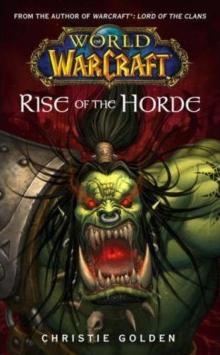 Rise of the Horde
Rise of the Horde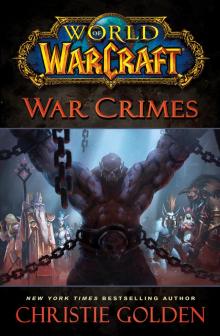 World of Warcraft: War Crimes
World of Warcraft: War Crimes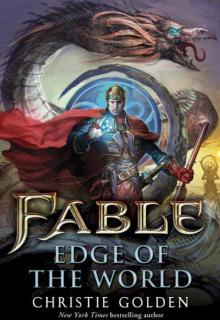 Fable: Edge of the World
Fable: Edge of the World Homecoming
Homecoming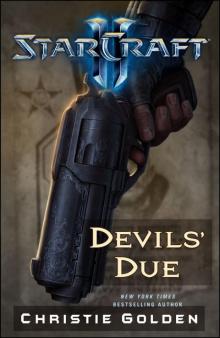 StarCraft II: Devil's Due
StarCraft II: Devil's Due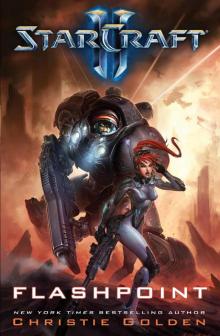 Starcraft II: Flashpoint
Starcraft II: Flashpoint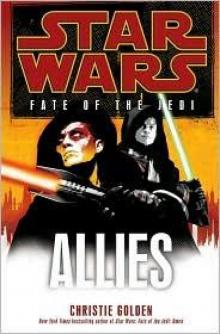 Allies
Allies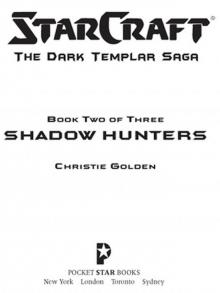 Shadow Hunters
Shadow Hunters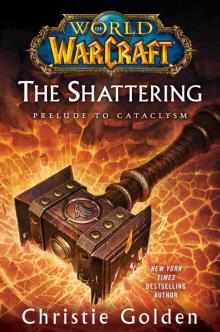 The Shattering: Prelude to Cataclysm wowct-1
The Shattering: Prelude to Cataclysm wowct-1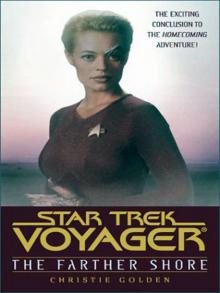 STAR TREK: VOY - Homecoming, Book Two - The Farther Shore
STAR TREK: VOY - Homecoming, Book Two - The Farther Shore King's Man and Thief
King's Man and Thief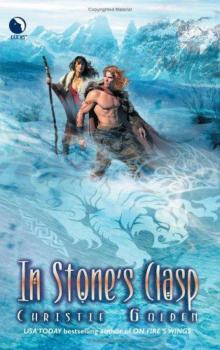 In Stone's Clasp
In Stone's Clasp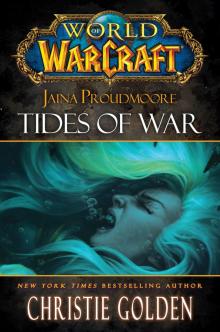 Jaina Proudmoore: Tides of War
Jaina Proudmoore: Tides of War Vampire of the Mists
Vampire of the Mists Star Wars: Fate of the Jedi II: Omen
Star Wars: Fate of the Jedi II: Omen King's man and thief cov-2
King's man and thief cov-2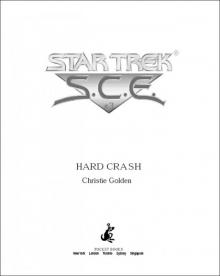 Star Trek
Star Trek StarCraft: Dark Templar: Twilight
StarCraft: Dark Templar: Twilight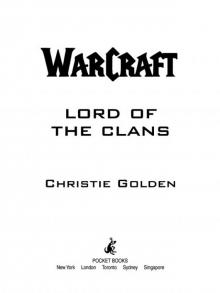 Lord Of The Clans
Lord Of The Clans ARKTIKA.1 (Short Story)
ARKTIKA.1 (Short Story)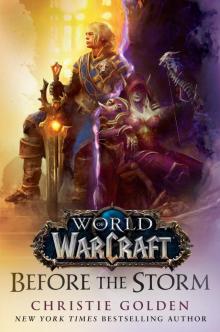 Before the Storm
Before the Storm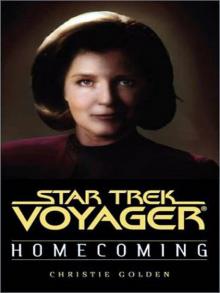 STAR TREK: VOY - Homecoming, Book One
STAR TREK: VOY - Homecoming, Book One Shadow of Heaven
Shadow of Heaven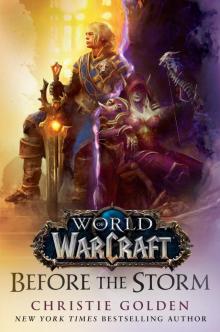 Before the Storm (World of Warcraft)
Before the Storm (World of Warcraft)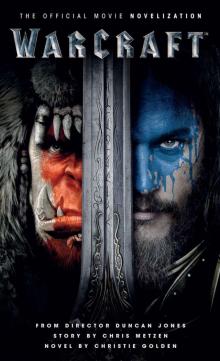 Warcraft Official Movie Novelization
Warcraft Official Movie Novelization Flashpoint
Flashpoint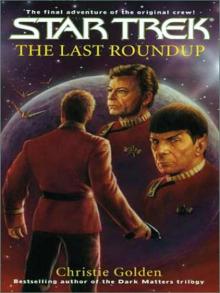 STAR TREK: The Original Series - The Last Roundup
STAR TREK: The Original Series - The Last Roundup On Fire’s Wings
On Fire’s Wings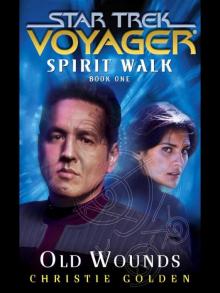 Spirit Walk, Book One
Spirit Walk, Book One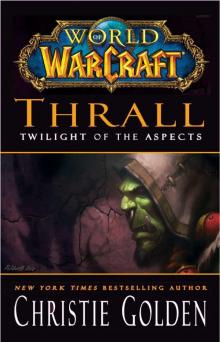 Thrall Twilight of the Aspects
Thrall Twilight of the Aspects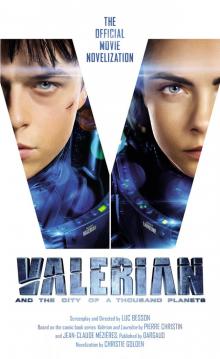 Valerian and the City of a Thousand Planets
Valerian and the City of a Thousand Planets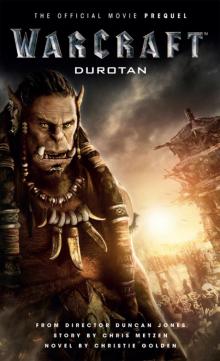 Warcraft
Warcraft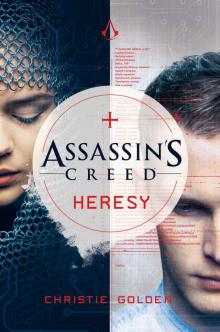 Assassin's Creed: Heresy
Assassin's Creed: Heresy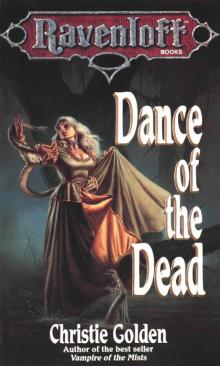 Dance of the Dead
Dance of the Dead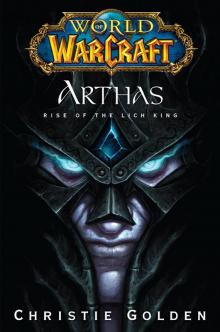 Arthas: Rise of the Lich King wow-6
Arthas: Rise of the Lich King wow-6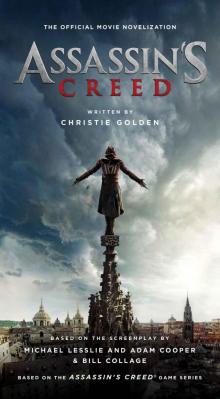 Assassin's Creed: The Official Movie Novelization
Assassin's Creed: The Official Movie Novelization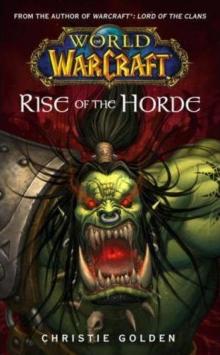 Rise of the Horde wow-2
Rise of the Horde wow-2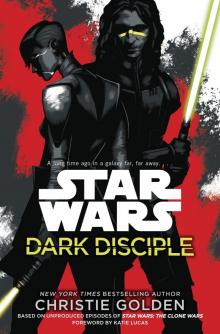 Dark Disciple
Dark Disciple Ghost Dance
Ghost Dance The Shattering
The Shattering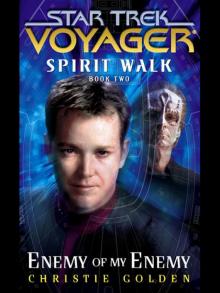 Spirit Walk, Book Two
Spirit Walk, Book Two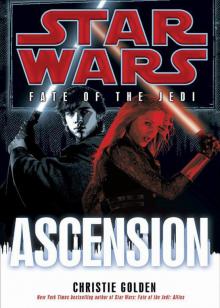 Star Wars: Fate of the Jedi: Ascension
Star Wars: Fate of the Jedi: Ascension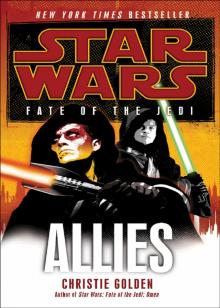 Star Wars: Fate of the Jedi V: Allies
Star Wars: Fate of the Jedi V: Allies The Enemy Within
The Enemy Within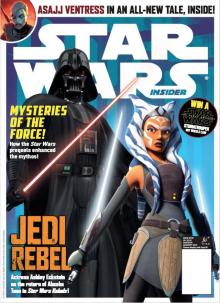 Kindred Spirits
Kindred Spirits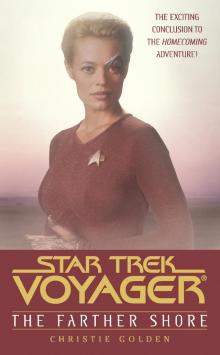 The Farther Shore
The Farther Shore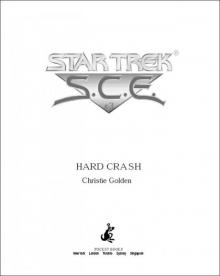 Star Trek: Hard Crash (Star Trek: Starfleet Corps of Engineers Book 3)
Star Trek: Hard Crash (Star Trek: Starfleet Corps of Engineers Book 3) Twilight
Twilight